英国历史2.1English Culture
- 格式:ppt
- 大小:1.01 MB
- 文档页数:54
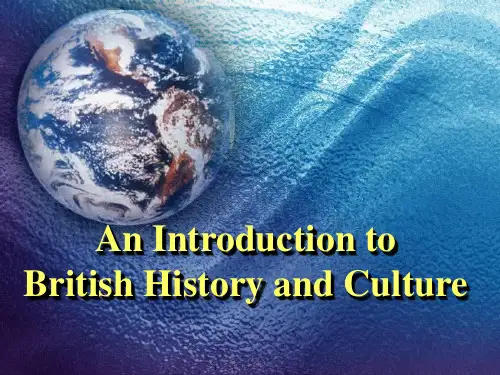
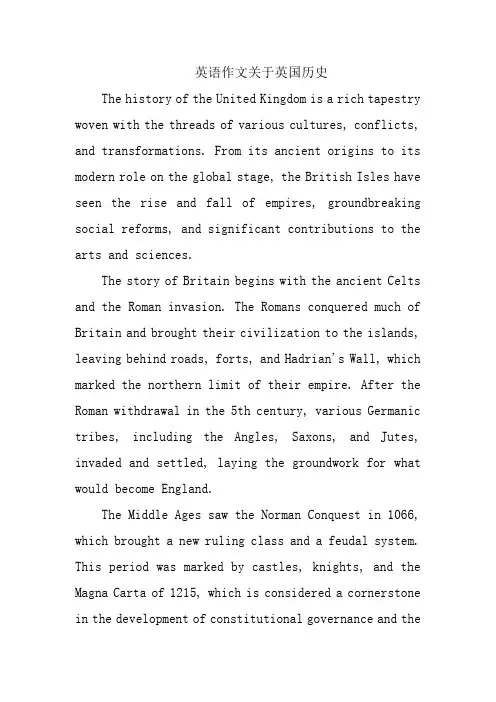
英语作文关于英国历史The history of the United Kingdom is a rich tapestry woven with the threads of various cultures, conflicts, and transformations. From its ancient origins to its modern role on the global stage, the British Isles have seen the rise and fall of empires, groundbreaking social reforms, and significant contributions to the arts and sciences.The story of Britain begins with the ancient Celts and the Roman invasion. The Romans conquered much of Britain and brought their civilization to the islands, leaving behind roads, forts, and Hadrian's Wall, which marked the northern limit of their empire. After the Roman withdrawal in the 5th century, various Germanic tribes, including the Angles, Saxons, and Jutes, invaded and settled, laying the groundwork for what would become England.The Middle Ages saw the Norman Conquest in 1066, which brought a new ruling class and a feudal system. This period was marked by castles, knights, and the Magna Carta of 1215, which is considered a cornerstone in the development of constitutional governance and therule of law.The Tudor period, from 1485 to 1603, was a time of great change. The Reformation split the Christian church in Britain, leading to the establishment of the Church of England. This era also saw the exploration and expansion of the British Empire, with figures like Sir Francis Drake and Walter Raleigh.The 17th and 18th centuries were significant for the growth of the British Empire and the Industrial Revolution. Britain became the world's leading naval power and colonized large parts of North America, the Caribbean, and India. The Industrial Revolution began in Britain and transformed the country from an agrarian society into an industrial powerhouse.The 19th century was a time of social and political reform. The Victorian era, named after Queen Victoria, was characterized by immense progress in science, technology, and culture, but also by deep social inequalities. The Reform Acts expanded the right to vote, and the labor movement fought for workers' rights.The 20th century brought two world wars, whichreshaped the map of Europe and saw the decline of the British Empire. The UK played a pivotal role in both conflicts, but the aftermath of World War II led to a significant reduction in Britain's global influence. Nonetheless, the British cultural influence remained strong, with the spread of the English language and the British Commonwealth.Today, the United Kingdom stands as a modern, multicultural nation with a rich historical legacy. It continues to be an influential player in international politics, science, and culture.中文翻译:英国的历史是一幅丰富的挂毯,由各种文化、冲突和变革的线编织而成。
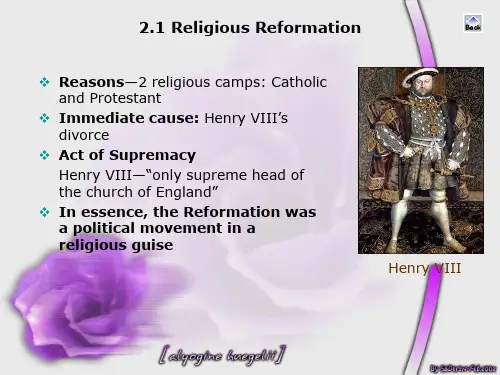


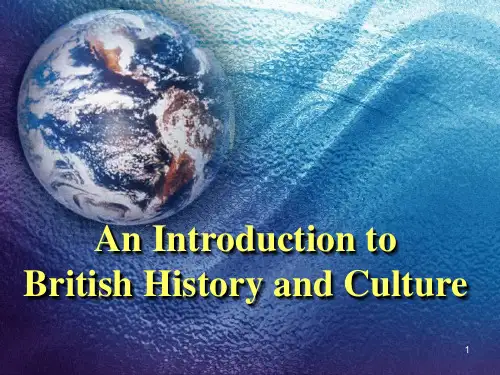
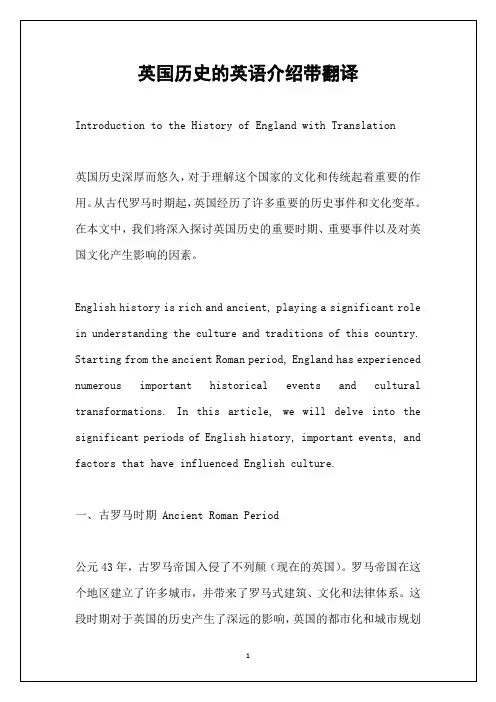
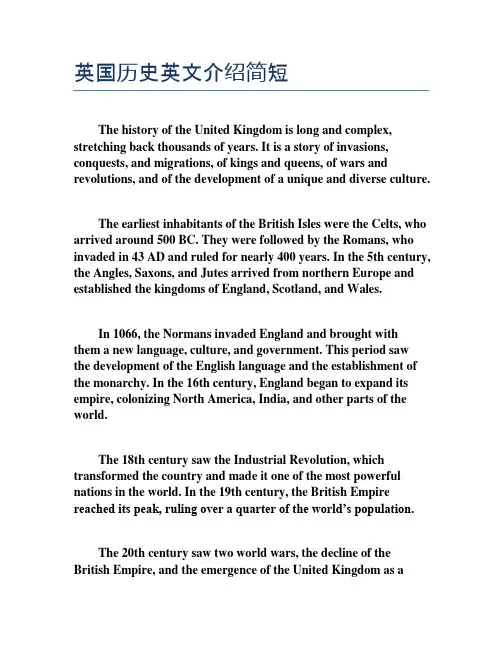
英国历史英文介绍简短The history of the United Kingdom is long and complex, stretching back thousands of years. It is a story of invasions, conquests, and migrations, of kings and queens, of wars and revolutions, and of the development of a unique and diverse culture.The earliest inhabitants of the British Isles were the Celts, who arrived around 500 BC. They were followed by the Romans, who invaded in 43 AD and ruled for nearly 400 years. In the 5th century, the Angles, Saxons, and Jutes arrived from northern Europe and established the kingdoms of England, Scotland, and Wales.In 1066, the Normans invaded England and brought with them a new language, culture, and government. This period saw the development of the English language and the establishment of the monarchy. In the 16th century, England began to expand its empire, colonizing North America, India, and other parts of the world.The 18th century saw the Industrial Revolution, which transformed the country and made it one of the most powerful nations in the world. In the 19th century, the British Empire reached its peak, ruling over a quarter of the world’s population.The 20th century saw two world wars, the decline of the British Empire, and the emergence of the United Kingdom as amodern, democratic nation. Today, the UK is a member of the European Union and a major player in world affairs. Its history is a fascinating and complex one, and its culture is unique and diverse.。
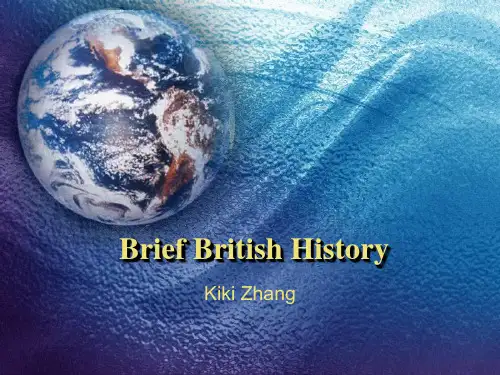
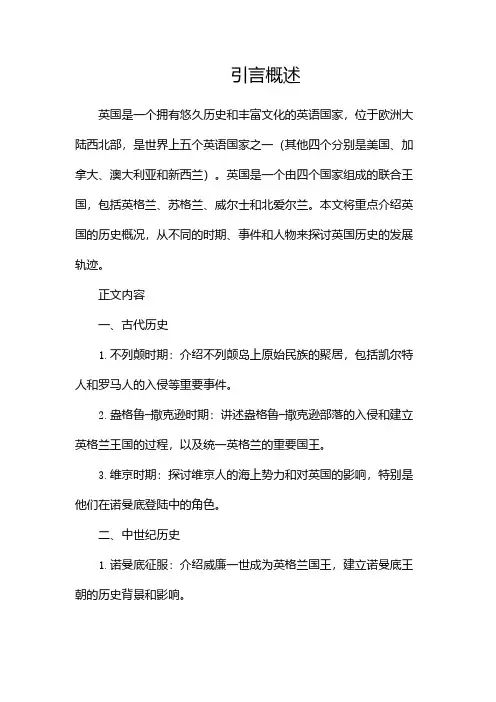
引言概述英国是一个拥有悠久历史和丰富文化的英语国家,位于欧洲大陆西北部,是世界上五个英语国家之一(其他四个分别是美国、加拿大、澳大利亚和新西兰)。
英国是一个由四个国家组成的联合王国,包括英格兰、苏格兰、威尔士和北爱尔兰。
本文将重点介绍英国的历史概况,从不同的时期、事件和人物来探讨英国历史的发展轨迹。
正文内容一、古代历史1.不列颠时期:介绍不列颠岛上原始民族的聚居,包括凯尔特人和罗马人的入侵等重要事件。
2.盎格鲁-撒克逊时期:讲述盎格鲁-撒克逊部落的入侵和建立英格兰王国的过程,以及统一英格兰的重要国王。
3.维京时期:探讨维京人的海上势力和对英国的影响,特别是他们在诺曼底登陆中的角色。
二、中世纪历史1.诺曼底征服:介绍威廉一世成为英格兰国王,建立诺曼底王朝的历史背景和影响。
2.骑士精神和十字军东征:探讨中世纪欧洲的骑士精神和十字军东征对英格兰的影响,以及英格兰维持外交平衡的策略。
3.玫瑰战争:讲述兰开斯特家族和约克家族之间的争斗,以及亨利七世的登基结束了这场战争。
三、近代历史1.英国帝国扩张:探讨英国帝国的形成和扩张过程,包括殖民地的建立、工业革命对英国的影响以及英国对全球贸易的控制。
2.工业革命和城市化:介绍英国在18世纪和19世纪的工业革命,以及城市化进程对社会结构和经济发展的影响。
3.英国政治制度的演变:探讨英国政治制度的演变,包括君主立宪制度的建立、议会的权力扩大以及普选权的实现。
四、现代历史1.两次世界大战:讲述英国在两次世界大战中的角色和贡献,特别是在二战中与纳粹德国的斗争。
2.工党和保守党执政:探讨英国工党和保守党在近代的执政经历和政策变化。
3.英国加入欧盟和脱欧:介绍英国加入欧盟的历史背景和对英国的影响,以及脱欧公投和英国脱欧的过程。
五、现代英国文化与社会1.英国皇室:介绍英国皇室的历史和现状,以及对英国文化和社会的影响。
2.英国文学和艺术:探讨英国文学和艺术的发展,包括莎士比亚、狄更斯等重要作家和艺术家的作品对全球文化的影响。
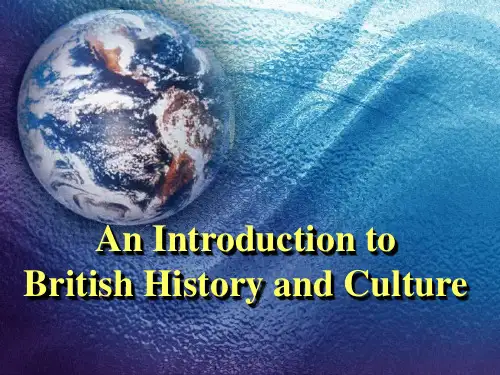
目 录第1卷(英国)第1章 土地和人民1.1 复习笔记1.2 典型题(含考研真题)详解第2章 英国历史2.1 复习笔记2.2 典型题(含考研真题)详解第3章 政治、政府及教育3.1 复习笔记3.2 典型题(含考研真题)详解第4章 补充材料4.1 复习笔记4.2 典型题(含考研真题)详解第2卷(美国)第1章 总 括1.1 复习笔记1.2 典型题(含考研真题)详解第2章 美国的历史2.1 复习笔记2.2 典型题(含考研真题)详解第3章 政府形式和社会生活3.1 复习笔记3.2 典型题(含考研真题)详解第4章 补充材料4.1 复习笔记4.2 典型题(含考研真题)详解第1卷(英国)第1章 土地和人民1.1 复习笔记Ⅰ. The British Isles and Great Britain1. Full name2. Constituents3. Introduction of Each Part4. Physiographic Features5. Climate and W eather6. Factors Influencing English W eather7. Inland W ater8. The English LanguageⅡ. People and the State1. People2. Party Politics3. Central Government4. Local Governments5. Law6. Reform of the Law Court7. Legal Profession8. Police Force9. Religion10. Characteristics of the English PeopleⅢ. National Economy1. General Survey2. Company Law and Framework of Industry3. Heavy and Light Industries4. Textile Industries5. Agriculture6. Transportation and Communication7. British Disease and Thatcher’s Medicine8. CitiesⅠ. The British Isles and Great Britain (不列颠群岛及大不列颠)1. Full name (全称)The United Kingdom of Great Britain and Northern Ireland大不列颠及北爱尔兰联合王国2. Constituents (组成部分)(1)The Island of Great Britain: England, Scotland and W ales大不列颠岛:英格兰、苏格兰和威尔士(2)Northern Ireland北爱尔兰3. Introduction of Each Part (各部分简介)(1)England (英格兰)England is the largest and most developed of all the three political divisions.英格兰是三个中最大的和最发达的政治分区。
英伦历史的斑斓画卷Encompassing a vast array of events and transformations, British history is a tapestry of diverse threads that weave together the rich cultural, political, and social fabricsof the nation. Spanning from ancient times to the modern era, this essay aims to delve into the fascinating journeyof Britain, highlighting key moments and figures that have shaped its identity.The ancient history of Britain begins with the settlement of the first humans on the island, known as the Stone Age. This period is marked by the development of primitive tools and structures, such as the Stonehenge, a mysterious monument that remains a testament to the ancient civilization's sophisticated understanding of astronomy.The Bronze Age saw the emergence of more advanced communities and trade networks, followed by the Iron Age, during which the Celtic tribes established their influence across the British Isles. However, it was the Romaninvasion in 43 AD that marked a significant turning pointin British history. The Romans brought with them newtechnologies, infrastructure, and a centralized government, leaving a lasting impact on British culture and society.The fall of the Roman Empire in the 5th century led toa period of political instability and cultural fusion known as the Dark Ages. This era was followed by the Norman Conquest of England in 1066, when the French-speaking Normans overthrew the Anglo-Saxon kingdom and established a new feudal system. This event marked a significant shift in the language and culture of England, as French became the language of the government and nobility.The Tudor period, marked by the reigns of Henry VII, Henry VIII, and Elizabeth I, saw the emergence of Englandas a major European power. Henry VII consolidated power and established the Tudor dynasty, while Henry VIII's reign saw significant religious changes, as he broke away from the Roman Catholic Church and established the Church of England. Elizabeth I, known as the "Virgin Queen," presided over a period of economic and cultural prosperity, during which England's naval power and exploration reached new heights.The 17th century marked a period of political upheaval, as the English Civil War erupted between the Royalists andthe Parliamentarians. This conflict ended with theexecution of King Charles I and the establishment of the Commonwealth under Oliver Cromwell. However, theRestoration of the Monarchy in 1660 marked the return ofthe Stuart dynasty and the end of the Puritan era.The 18th century was a time of significant social and economic transformation, known as the Industrial Revolution. This period saw the development of new technologies and manufacturing methods, which led to rapid urbanization and economic growth. The Empire expanded under the leadershipof George III, as Britain emerged as a global power, controlling vast territories and trading networks.The 19th century was marked by furtherindustrialization and imperial expansion. The Victorian era, named after Queen Victoria's long reign, saw significant economic and social progress, as well as the development of major cities like London. However, it was also a period of social and political tensions, as the working class struggled for better conditions and rights.The 20th century brought with it two world wars and significant social and political changes. Britain'sinvolvement in the First World War led to significant casualties and economic hardships, while the Second World War saw the country stand against fascism and emerge as a key ally of the United States and the Soviet Union. Post-war Britain saw the implementation of welfare reforms and the decolonization of its Empire, as well as the electionof the first female prime minister, Margaret Thatcher, in 1979.In conclusion, British history is a rich tapestry of events and transformations that have shaped the nation's identity. From ancient civilizations to modern times, the threads of this history are woven with the stories of brave leaders, innovators, and ordinary people who havecontributed to building a nation that is respected and admired worldwide. As we delve into the past, we gain a deeper understanding of the present and a clearer perspective on the future of this fascinating country.**英国历史的斑斓画卷**英国历史是一幅丰富多彩、交织着各种事件的画卷,这些事件共同塑造了英国丰富多样的文化、政治和社会风貌。
英语作文关于英国历史The history of England is a rich tapestry woven with the threads of conquest, cultural evolution, and the rise andfall of powerful monarchs. It is a story that begins with the ancient Britons, continues through the Roman occupation, the Norman Conquest, and into the modern era marked by the Industrial Revolution and the British Empire.The early history of England is marked by the arrival of various tribes and peoples, such as the Celts, Romans, and Anglo-Saxons. The Roman period, from the 1st to the 5th century, brought significant advancements in infrastructure, including the construction of roads, aqueducts, and forts.The fall of the Roman Empire led to a period of Anglo-Saxon rule, which saw the development of a distinct English culture and language.The Norman Conquest in 1066, led by William the Conqueror, was a pivotal moment in English history. It not only changed the ruling class but also had a profound impact on the language, architecture, and legal system. The Middle Agesthat followed were characterized by the feudal system, the Crusades, and the Hundred Years' War with France.The Renaissance brought about a rebirth of art, science, and literature, with figures like William Shakespeare leaving an indelible mark on the English language and culture. The Tudor period, with its dramatic shifts in power and religiousupheavals, saw the rise of England as a major European power.The 17th century was a time of great change, with the English Civil War leading to the execution of King Charles I and the brief period of the Commonwealth under Oliver Cromwell. The Glorious Revolution of 1688 established a constitutional monarchy and the Bill of Rights, setting the stage for modern democracy.The 18th and 19th centuries were the age of theIndustrial Revolution, which transformed England from a rural society to an urban, industrial powerhouse. This period also saw the expansion of the British Empire, with colonies stretching across the globe, bringing both wealth and conflict.The 20th century was marked by two World Wars, which significantly impacted England's role in the world. Post-war Britain saw the establishment of the National Health Service and the gradual decline of the empire, leading to a redefinition of its place in the global community.Today, England's history continues to influence its culture, politics, and identity. It is a history that is celebrated in its landmarks, museums, and the stories passed down through generations, reminding us of the complex and fascinating journey that has shaped the nation we know today.。
英国历史英语作文80词The history of Britain is a tapestry of rich cultural threads, weaving together diverse stories of conquest, revolution, and progress. From the ancient Roman occupation to the Norman invasion, the story of Britain is marked by foreign influence and internal struggle. The Middle Ages saw the emergence of powerful monarchs like King Arthur and the Norman Kings, who left lasting impacts on the country's political and cultural landscape. The Tudor period marked a renaissance in literature, art, and exploration, with Queen Elizabeth I presiding over a golden age of English culture. The Industrial Revolution transformed Britain into a global superpower, shaping not just its economy but also itssocial and political landscape. The 20th century sawBritain involved in two world wars, emerging as a key ally in the fight against fascism. Today, Britain stands as a symbol of democratic values and economic prowess, a testament to its rich and storied history.**英国历史的独特轨迹**英国历史是一幅丰富多彩的文化织锦,编织着征服、革命和进步的多样化故事。